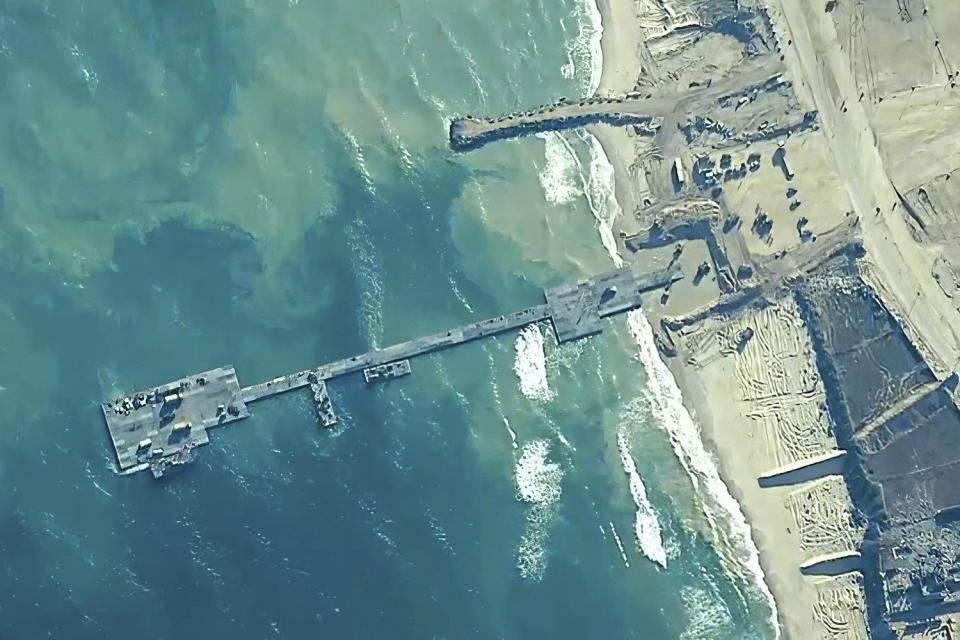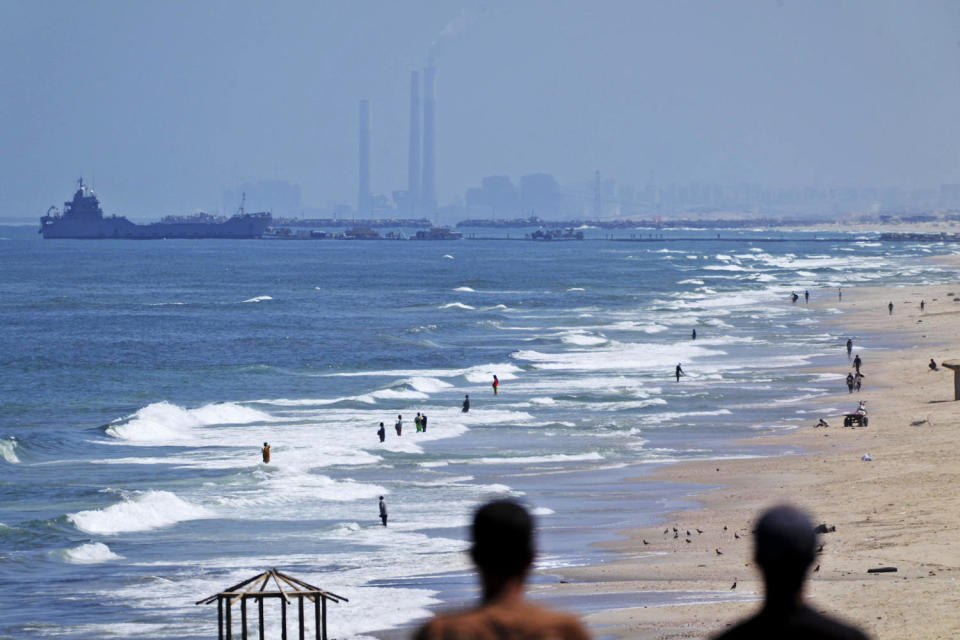First aid flows into Gaza over massive U.S. pier
Trucks carrying humanitarian aid began moving ashore into Gaza Friday using a temporary pier built by the United States, delivering desperately needed supplies to the besieged Palestinian enclave.
The floating dock is part of a makeshift effort to stave off a possible famine in Gaza, where Israel’s military assault has shut off a number of crossings that are crucial for supplies of food, fuel and other aid.
Israeli forces pressed on with sweeping operations against Hamas in the north and south of the enclave, while the country's lawyers defended its ground offensive in Rafah at the United Nations' top court.
The aid trucks began moving into Gaza at around 9 a.m. local time (2 a.m. ET), the U.S. Central Command said in a post on X, a day after the military finished installing the pier.
"No U.S. troops went ashore in Gaza," CENTCOM said. "This is an ongoing, multinational effort to deliver additional aid to Palestinian civilians in Gaza via a maritime corridor that is entirely humanitarian in nature," it added, noting that aid was being donated by a number of countries and humanitarian organizations.
Britain said that its aid was among that delivered via the pier.
"UK aid has been successfully delivered to the Gaza shore today, in the first delivery across the US-built temporary pier. The first of 8,400 shelter coverage kits — temporary shelters made up of plastic sheeting — have arrived in Gaza, alongside aid from the US and UAE," the U.K. government said in a statement, adding that more aid would follow in the coming weeks.

The Rafah crossing, the main entry point for aid into Gaza, has been shut for nearly two weeks after Israeli forces seized the Palestinian side as part of a ground assault that has seen them push deeper into eastern Rafah and force hundreds of thousands of Palestinians to evacuate the city once designated a "safe zone."
The nearby Kerem Shalom crossing — where four Israeli soldiers were killed in a recent Hamas attack — was also closed, but the Israel Defense Forces said it has since opened, along with a separate entry point, the "Western Erez" crossing.
The Biden administration has expressed growing frustration over conditions in Gaza, warning it will suspend the shipment of certain arms if the U.S. ally moves ahead with a full-scale invasion of Rafah.
The IDF said Friday that troops continued to operate across "several locations" in the city and had dismantled a long-range rocket launch site.
It also said troops had “expanded combat zones and intensified operational control” around Jabalia in northern Gaza, where thousands of people have been displaced by renewed combat in areas the IDF previously said it had cleared.
Israel defended its operations in Rafah, saying they were presently "limited," at the International Court of Justice Friday, in a case brought against South Africa accusing the country of genocide over its Gaza offensive. But Defense Minister Yoav Gallant has said more troops are expected to join the ground operation.
Local health officials say more than 35,000 people have been killed in Gaza since Israel launched its assault following Hamas' Oct. 7 attacks, in which some 1,200 people were killed and around 250 others taken hostage, according to Israeli officials.
Both Israel and the U.S. have rejected the allegations of genocide.
As the fighting continues, humanitarian groups and doctors have sounded the alarm over the limited flow of aid into Gaza in recent days.
While bringing in food and other supplies to Gaza by land is far more efficient, recent convoys have been attacked by Israeli settlers and activist groups seeking to prevent aid from reaching Gaza as long as Hamas is still holding Israeli hostages.
Some of the trucks have come from neighboring Jordan. Two senior Jordanian officials told NBC News their convoys have been attacked by Israeli hardliners, and that the Israeli army has failed to address the problem sufficiently.
Palestinian American doctor Adam Hamawy said aid of all kinds is urgently needed in Rafah, where he has been volunteering at one of the last functioning hospitals in the city amid increasingly worrying circumstances.
“I see little kids running around that are basically skin and bones," he told NBC News on Wednesday. "Food becomes an issue where everyone is basically having a minimal meal a day."
The United Nations thanked the U.S. for its efforts on Thursday, but also warned that the flow of aid into Gaza could not be dependent on the temporary pier.

State Department spokesman Vedant Patel emphasized in a news briefing that the U.S. pier was meant to be “additive to the other routes” facilitating aid into Gaza.
“Although this is a new mechanism of assistance for Gaza, more, of course, must be done,” he said.
Israel has laid blame for delays reopening the Rafah crossing on Egypt, with Israeli Prime Minister Benjamin Netanyahu telling CNBC's Sara Eisen in an interview on Wednesday, "we want to see it open." Egypt has said Israel is squarely to blame for keeping the crossing closed since its takeover of the Palestinian side.
The construction of the U.S. pier comes as the U.N.'s aid chief warned that famine had become an immediate risk in Gaza as food dwindled in the enclave.
“Stocks of food which were in place already in southern Gaza are running out. I think we’re talking about almost none left,” Martin Griffiths, Under-Secretary-General for Humanitarian Affairs and Emergency Relief Coordinator, told Reuters in an interview in Geneva.
Patel said Thursday that the U.S. was "deeply concerned about the reports indicating worsening conditions and imminent famine in Gaza."
"Israel needs to do more to urgently provide sustained and unimpeded access for humanitarian assistance to enter both northern and southern Gaza," he said.
This article was originally published on NBCNews.com

